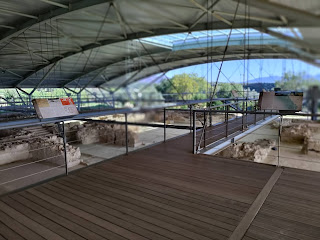Greece 1: The Trip
 |
| Mycenaean Wall |
In ancient times travelers, upon returning to their native village, would sometimes invite their neighbors over for a feast to celebrate their safe arrival. Then they would tie them down and force them to watch hours of vacation slides. This activity has long since been banned by the Geneva Convention, so what you see here is the next best thing. I am using this blog which has been inactive for a long time to record some of my memories and photos of a recent trip. You can read along if you choose. As for a feast, there are some leftovers in the back of your fridge that should really get eaten or tossed. Up to you.
 | |
| Olympia Frieze |
In October my wife and I visited Greece for the first time. We took a tour of the Peloponnese. Twelve tourists and two guides spent two weeks wandering, and we added three days in Athens for good measure. (TL:DR version: The trip was excellent.)
The Peloponnese is the southern part of mainland Greece, a peninsula roughly the size of Connecticut. It is home to some of the most famous elements of ancient Greek culture. Half of the twelve labors of Hercules took place there. The legendary warriors of Sparta lived there. Mycenae gave its name to the culture associated with the Trojan War. The Olympic Games were held there. The Greek War of Independence started in the region known as the Mani.
To get to the Peloponnese from Athens you cross over a narrow piece of land that includes ancient Corinth and a place called Isthmia, from which we get the word isthmus.
We traveled through the Argolid region, getting stuck in a traffic jam (see video). None of us seemed to mind very much.
By the way, a week later, one member of our tour tried to take a picture of some goats and got into a disagreement with a herd dog who had a strict "no paparazzi" policy. This resulted in our friend getting several stitches and a drain. Because Greece lacks our highly sophisticated medical billing system his cost was... nothing.
The first site we visited was Nemea, home of the Nemean lion which Hercules killed. It was home to the Nemean Games, one of the four panhellenic athletic festivals. (The one everyone knows, of course, is the Olympic Games. We visited the stadium which was so muddy (there had been record-breaking rains earlier) that most of us had mud on our shoes for many days.Here are a couple of photos of the Sanctuary of Zeus at Nemea.



Comments
Post a Comment